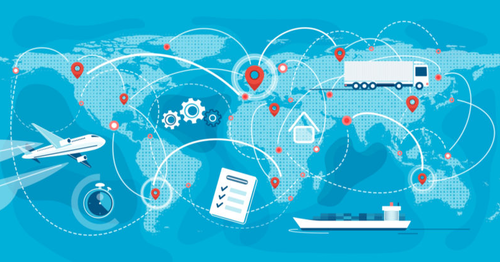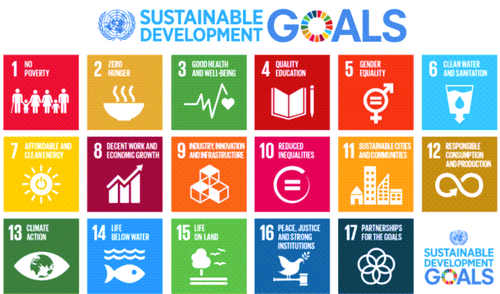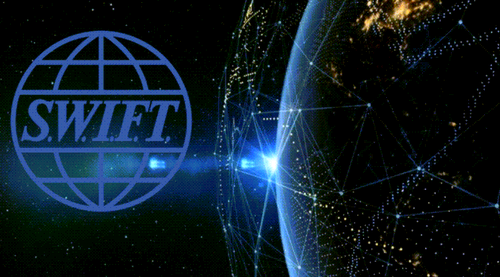 Via WinterOak.org.uk
Via WinterOak.org.uk
Welcome to the second phase of the Great Reset: war.
While the pandemic acclimatised the world to lockdowns, normalised the acceptance of experimental medications, precipitated the greatest transfer of wealth to corporations by decimating SMEs and adjusted the muscle memory of workforce operations in preparation for a cybernetic future, an additional vector was required to accelerate the economic collapse before nations can ‘Build Back Better.’
I present below several ways in which the current conflict between Russia and Ukraine is the next catalyst for the World Economic Forum’s Great Reset agenda, facilitated by an interconnected web of global stakeholders and a diffuse network of public-private partnerships.
1. The war between Russia and Ukraine is already causing unprecedented disruption to global supply chains, exacerbating fuel shortages and inducing chronic levels of inflation.
As geopolitical tensions morph into a protracted conflict between NATO and the Sino-Russia axis, a second contraction may plunge the economy into stagflation.
In the years ahead, the combination of subpar growth and runaway inflation will force a global economic underclass into micro-work contracts and low-wage jobs in an emerging gig economy.
Another recession will compound global resource thirst, narrow the scope for self-sufficiency and significantly increase dependence on government subsidies.
With the immiseration of a significant portion of the world’s labour force looming on the horizon, this may well be a prelude to the introduction of a Universal Basic Income, leading to a highly stratified neo-feudal order.
Therefore, the World Economic Forum’s ominous prediction that we will ‘own nothing and be happy’ by 2030 seems to be unfolding with horrifying rapidity.
2. The war’s economic fallout will lead to a dramatic downsizing of the global workforce.
The architects of the Great Reset have anticipated this trend for a number of years and will exploit this economic turbulence by propelling the role of disruptive technologies to meet global challenges and fundamentally alter traditional business patterns to keep pace with rapid changes in technology.
Like the pandemic, disaster preparedness in the age of conflict will rest significantly on the willingness to embrace specific technological innovations in the public and private spheres so that future generations can supply the labour demands of the Great Reset.
A recurring theme in Klaus Schwab’s Shaping the Future of the Fourth Industrial Revolution is that groundbreaking technological and scientific innovations will no longer be relegated to the physical world around us but become extensions of ourselves.
He emphasises the primacy of emerging technologies in a next generation workforce and highlights the urgency to push ahead with plans to digitise several aspects of the global labour force through scalable technology based solutions.
Those spearheading the Great Reset seek to manage geopolitical risk by creating new markets which revolve around digital innovations, e-strategies, telepresence labour, Artificial Intelligence, robotics, nanotechnology, the Internet of Things and the Internet of Bodies.
The breakneck speed in which AI technologies are being deployed suggest that the optimization of such technologies will initially bear on traditional industries and professions which offer a safety net for hundreds of millions of workers, such as farming, retail, catering, manufacturing and the courier industries.
However, automation in the form of robots, smart software and machine learning will not be limited to jobs which are routine, repetitive and predictable.
AI systems are on the verge of wholesale automation of various white collar jobs, particularly in areas which involve information processing and pattern recognition such as accounting, HR and middle management positions.
Although anticipating future employment trends is no easy task, it’s safe to say that the combined threat of pandemics and wars means the labour force is on the brink of an unprecedented reshuffle with technology reshaping logistics, potentially threatening hundreds of millions of blue and white collar jobs, resulting in the greatest and fastest displacement of jobs in history and foreshadowing a labour market shift which was previously inconceivable.
While it has long been anticipated that the increased use of technology in the private sector would result in massive job losses, pandemic lockdowns and the coming disruption caused by a war will speed up this process, and many companies will be left with no other option but to lay off staff and replace them with creative technological solutions merely for the survival of their businesses.
In other words, many of the jobs which will be lost in the years ahead were already moving towards redundancy and are unlikely to be recovered once the dust is settled.
3. The war has significantly reduced Europe’s reliance on the Russian energy sector and reinforced the centrality of the UN Sustainable Development Goals and ‘net zero‘ emissions which lies at the heart of the Great Reset.
Policymakers marching lockstep with the Great Reset have capitalised on the tough sanctions against Russia by accelerating the shift towards ‘green’ energy and reiterating the importance of decarbonisation as part of the ‘fight against climate change’.
However, it would be very short-sighted to assume that the Great Reset is ultimately geared towards the equitable distribution of ‘green’ hydrogen and carbon-neutral synthetic fuels replacing petrol & diesel.
While UN SDGs are crucial to post-pandemic recovery, more importantly, they are fundamental to the makeover of shareholder capitalism which is now being vaunted by the Davos elites as ‘stakeholder capitalism’.
In economic terms, this refers to a system where governments are no longer the final arbiters of state policies as unelected private corporations become the de facto trustees of society, taking on the direct responsibility to address the world’s social, economic and environmental challenges through macroeconomic cooperation and a multi-stakeholder model of global governance.
Under such an economic construct, asset holding conglomerates can redirect the flow of global capital by aligning investments with the UN’s SDGs and configuring them as Environmental, Social, and Corporate Governance (ESG) compliant so that new international markets can be built on the disaster and misery of potentially hundreds of millions of people reeling from the economic collapse caused by war.
Therefore, the war offers a huge impetus for the governments pushing the reset to actively pursue energy independence, shape markets towards ‘green and inclusive growth’ and eventually move populations towards a cap-and-trade system, otherwise known as a carbon credit economy.
This will centralise power in the hands of stakeholder capitalists under the benevolent guise of reinventing capitalism through fairer and greener means, using deceptive slogans like ‘Build Back Better’ without sacrificing the perpetual growth imperative of capitalism.
4. Food shortages created by the war will offer a major boon to the synthetic biology industry as the convergence of digital technologies with materials science and biology will radically transform the agricultural sector and encourage the adoption of plant-based and lab-grown alternatives on a global scale.
Russia and Ukraine are both breadbaskets of the world and critical shortages in grains, fertilisers, vegetable oils and essential foodstuffs will catapult the importance of biotechnology to food security and sustainability and give birth to several imitation meat start-ups similar to ‘Impossible Foods’ which was co-funded by Bill Gates.
One can therefore expect more government regulation to usher a dramatic overhaul to industrial food production and cultivation, ultimately benefiting agribusiness and biotech investors, since food systems will be redesigned through emerging technologies to grow ‘sustainable’ proteins and CRISPR gene-edited patented crops.
5. Russia’s exclusion from SWIFT (The Society for Worldwide Interbank Financial Telecommunication) foreshadows an economic reset which will generate precisely the kind of blowback necessary for corralling large swathes of the global population into a technocratic control grid.
As several economists have opined, weaponizing SWIFT, CHIPS (The Clearing House Interbank Payments System) and the US Dollar against Russia will only spur geopolitical rivals like China to accelerate the process of de-dollarisation.
The main benefactor of economic sanctions against Russia appears to be China which can reshape the Eurasian market by encouraging member states of the Shanghai Cooperation Organisation (SCO) and BRICS to bypass the SWIFT ecosystem and settle cross-border international payments in the Digital Yuan.
While the demand for cryptocurrencies will see a massive spike, this is likely to encourage many governments to increasingly regulate the sector through public blockchains and enforce a multilateral ban on decentralised cryptocurrencies.
Easiest way to get your first bitcoin (Ad)
The shift to crypto could be the dress rehearsal to eventually expedite plans for programmable money overseen by a federal regulator, leading to the greater accretion of power in the hands of a powerful global technocracy and thus sealing our enslavement to financial institutions.
I believe this war will bring currencies to parity, therefore heralding a new Bretton Woods moment which promises to transform the operation of international banking and macroeconomic cooperation through the future adoption of central bank digital currencies.
6. This war marks a major inflection point in the globalist aspiration for a new international rules-based order anchored in Eurasia.
As the ‘father of geopolitics,’ Halford Mackinder, opined over a century ago, the rise of every global hegemon in the past 500 years has been possible because of dominance over Eurasia. Similarly, their decline has been associated with losing control over that pivotal landmass.
This causal connection between geography and power has not gone unnoticed by the global network of stakeholders representing the WEF, many of whom have anticipated the transition to a multipolar era and return to great power competition amid America’s receding political and economic influence and a pressing need for what technocrats call smart globalisation.
While America tries desperately to cling to its superpower status, China’s economic ascent and Russia’s regional ambitions threaten to upend the strategic axial points of Eurasia (Western Europe and Asia Pacific).
The region in which America previously enjoyed uncontested hegemony is no longer impervious to cracks and we may be witnessing a changing of the guard which dramatically alters the calculus of global force projection.
Although China’s ambitious Belt and Road Initiative (BRI) has the potential to unify the world-island (Asia, Africa and Europe) and cause a tectonic shift in the locus of global power, the recent invasion of Ukraine will have far-reaching consequences for China-Europe rail freight.
The Ukrainian President Zelensky claimed that Ukraine could function as the BRI’s gateway to Europe. Therefore, we cannot ignore China’s huge stake in the recent tensions over Ukraine, nor can we ignore NATO’s underlying ambition to check China’s rise in the region by limiting the sale of Ukrainian assets to China and doing everything in its capacity to thwart The Modern Silk Road.
As sanctions push Russia towards consolidating bilateral ties with China and fully integrating with the BRI, a Pan-Eurasian trading bloc may be the realignment which forces a shared governance of the global commons and a reset to the age of US exceptionalism.
7. With speculation mounting over the war’s long-term impact on bilateral trade flows between China and Europe, the Russia-Ukraine conflict will catapult Israel – a leading advocate of the Great Reset – to even greater international prominence.
Israel is a highly attractive BRI market for China and the CCP is acutely aware of Israel’s importance as a strategic outpost connecting the Indian Ocean and the Mediterranean Sea through the Gulf of Suez.
Furthermore, the Chinese government has for many years acknowledged the primacy of Israel as a global technology hub and capitalised on Israel’s innovation capabilities to help meet its own strategic challenges.
Therefore, Naftali Bennet’s mediation between Moscow and Kiev is likely to factor the instrumental role of the Belt and Road Initiative (BRI) in expanding both China and Israel’s regional and global strategic footprint.
Israel’s status as among the leading tech hubs of the future and gateway connecting Europe and the Middle East is inextricably tied to the web of physical infrastructures, such as roads, railways, ports and energy pipelines which China has been building over the past decade.
Already a powerhouse in auto-technologies, robotics and cybersecurity, Israel aspires to be the central nation in the millennial Kingdom and the country’s tech startups are predicted to play a key role in the fourth industrial revolution.
Strengthening its evolving relationship with China amid the Russia-Ukraine crisis could help propel Israel into a regional hegemon par excellence with a large share of centralised economic and technological power converging in Jerusalem.
As Israel embarks on efforts to diversify its export markets and investments away from the United States, it begs an important question.
Is Israel in the formative stages of outsourcing its security interests away from the US and hedging its bets on the Sino-Russia axis?
8. It is now common knowledge that Digital IDs are a central plank in the World Economic Forum’s Great Reset agenda and are to be streamlined across industries, supply chains and markets as a way of advancing the UN 2030 SDGs and delivering individualised and integrated services in future smart cities.
Many have cottoned on to how such a platform can be used to usher in a global system of technocratic population control and compliance by incorporating humanity into a new corporate value chain where citizens are mined as data commodities for ESG investors and human capital bond markets and assigned a social and climate score based on how well they measure up against the UN SDGs.
This seamless verification of people and connected devices in smart environments can only take place once our biometrics, health records, finances, education transcripts, consumer habits, carbon footprint and the entire sum of human experiences is stored on an interoperable database to determine our conformity with the UN SDGs, thus forcing a monumental change to our social contract.
Vaccine passports were initially touted by public-private partnerships as an entry point for Digital IDs. Now that such a logic has run its course, how might the present geopolitical tensions contribute to scaling what is the key node in a new digital ecosystem?
Ukraine has traditionally been called Europe’s breadbasket and alongside Russia, both nations are major global suppliers of staple grains. Therefore, the war has all the makings of a black swan for commodities and inflation.
With an economy teetering on the brink of collapse due to a global supply crunch, I believe the resulting economic tremors will trigger wartime emergencies across the world and the public will be told to brace themselves for rationing.
Once this takes place, the multilateral adoption of Digital IDs which interface with Central Bank Digital Currencies can be touted as the solution to efficiently manage and distribute household rations under an unprecedented state of emergency and exception.
The Bank of England has already floated the prospect of programmable cash which can only be spent on essentials or goods which an employer or government deem sensible.
Once the issuer is granted control over how it is spent by the recipient, it will become nigh impossible to function adequately without a Digital ID, which will be required to receive food parcels and obtain a basic means of subsistence. Think UBI (Universal Basic Income).
If food inflation continues on an upward trajectory with no signs of abating, governments may institute price controls in the form of rationing and ration entries could be logged on blockchain ledgers on the Digital ID to track our carbon footprint and consumptive habits during a national emergency.
9. Europe is directly in the line of fire once a hybrid war between NATO and the Sino-Russia axis is underway.
I would be remiss to ignore the clear and present danger posed by a cyber attack on banks and critical infrastructure or even a tentative and tactical nuclear exchange with intercontinental ballistic missiles (ICBMs).
I can’t see how any warring party will not be limited by the doctrine of mutually assured destruction so a thermonuclear fallout is unlikely.
However, the use of remote-access technologies to erase system memory from the SWIFT banking apparatus or Cross-Border Interbank Payment System can potentially render much of the international economy non-operational and send the dollar into a tailspin.
If an event of such cataclysmic proportions was to occur, it will undoubtedly lead to increasing demands to overhaul cyber security.
The fallout from such an event could very well establish a new global security protocol according to which citizens must possess a Digital ID as a necessary national security measure.
One can imagine how accessing the internet or public services in the aftermath of a nationwide cyberattack may require citizens to use a Digital ID to authenticate that their online activities and transactions are from a legitimate and non-malicious source.
There are few coincidences in politics.
10. The economic implications of this war will be so disastrous that governments and the public sector will require a significant injection of private capital to address the financing shortfall.
This will effectively render the traditional separation of powers between central banking institutions and governments obsolete, as the former will be positioned to disproportionately influence the fiscal trajectory of nation states, whose sovereignty will be hollowed out by the wholesale capture of governments by the central banks and hedge funds.
Therefore, the nation-state model is gradually being upended by a global technocracy, consisting of an unelected consortium of leaders of industry, central banking oligarchs and private financial institutions, most of which are predominantly non-state corporate actors attempting to restructure global governance and enlist themselves in the global decision-making process.
Therefore, the future of international relations and the social, economic and political transformation which the world is presently undergoing in light of the pandemic and Russia-Ukraine conflict will not be decided through multilateralism and elected representatives of sovereign states.
Rather, it will be decided through a network of multi-stakeholder partnerships which are motivated by the politics of expediency and not accountable to any electorate or beholden to any state and for whom concepts like sovereignty and international law are meaningless.
Sourced from ZeroHedge
Become a Patron!
Or support us at SubscribeStar
Donate cryptocurrency HERE
Subscribe to Activist Post for truth, peace, and freedom news. Follow us on SoMee, Telegram, HIVE, Flote, Minds, MeWe, Twitter, Gab, What Really Happened and GETTR.
Provide, Protect and Profit from what’s coming! Get a free issue of Counter Markets today.









